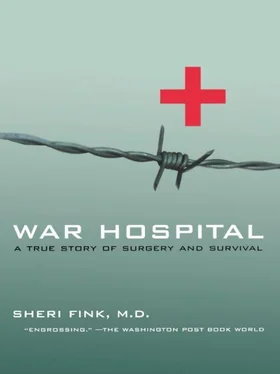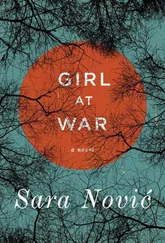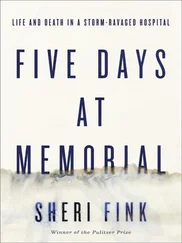Doctors came from all over Yugoslavia and the world to spend a few years gaining the precious, hands-on experience obtainable only in such a top-notch small-town hospital. In the late 1980s, physicians of eleven nationalities worked at the health clinic, including one from Nepal and one from India.
One day in 1990, during Ilijaz’s first summer working at the clinic, someone entered his examination room unannounced. With a start, Ilijaz turned from his patient to find a perplexed-looking young woman with long, black hair standing at the doorway.
“Oh!” she said. “Excuse me. I’m sorry to interrupt you. I was looking for my friend, Hamdija.”
“He’s in the next room. You can go through this door here.”
She thanked him and left. When he finished examining his patient, Ilijaz didn’t call for another. He went to Hamdija’s room instead.
He was pleased to find the woman still there. She had beautiful, dark eyes. He watched as she read the name on his white coat and broke into a soft, high-pitched laugh.
“So you’re Ilijaz Pilav,” she said and offered her hand. “It’s nice to meet the man I’m going to marry. I’m Doctor Fatima Dautbašić.”
Ilijaz’s friend, Hamdija, giggled.
In Bosnia, villagers have honed the art of future-telling over centuries. The woman explained that her great aunt had predicted she would soon find a husband. He would be a young doctor, and his name would be “Pilavović.” That was close enough to Pilav.
“Then let’s get started,” Ilijaz told her. “Let’s not waste any time.” The two began to date.
Fatima was a serious yet loquacious young woman who, unlike Ilijaz, had grown up knowing that she wanted to be a doctor. She cultivated equally cherished dreams of world travel and of settling down in a nice house to raise a family in the traditional Bosnian way. For now, though, she was content to fall in love. The two took strolls every night along the pedestrian walkway in Bratunac. Trips to the River Jadar for picnics with lambs on a spit, games, line dancing, and singing framed their summer romance. At night, driving back from the dark hills above the valley of Srebrenica, the lights of the town looked like a luminous strand of pearls spilled on black velvet.
THAT FALL OF 1990, a cultural festival took place in the building that housed Srebrenica’s historical museum. At the time, such events held no interest for a young bachelor like Ilijaz. But if he had gone, he would have seen groups of dancers take turns performing in traditional costumes that represented every phase of Srebrenica’s history—Roman, Serbian, Ottoman, Austrian, Yugoslav. The long vibrating tones that trilled from the tongues of the singers and moved the shuffling feet of the kolo dancers carried the distinct sound and the shared heritage of the Drina River valley where peace between neighbors had long outlasted periods of war.
They were simple songs, like the lullabies and love songs that echoed in homes high and low on both banks of the Drina—Bosnian and Serbian. From the coarse clucking falsettos of village women to the low-pitched croaks of tobacco-growing men, bowing the strings of their whiny, lutelike gusle or shargija , the songs and their sometimes-nonsensical words varied little.
Nini, nini
ninala te nana
ninala te nana
nini, nini
Ninala te
i uspavala te
i uspavala te
There was little in Ilijaz Pilav’s background to make him fear or dislike Serbs. He grew up hearing stories of World War II, when a multipartied civil war had ripped apart the region. But elderly villagers told Ilijaz that the occupying armies and local militias that passed through Gladovići conducted themselves with honor and left the civilians largely alone. Only one of Ilijaz’s family members, a grandfather, had been killed, but by which side, nobody knew or said.
* * *
Ilijaz’s first suspicions of Serbs traced back to medical school. In 1988 Serb students started to band together in the dormitory and post large photographs of Serbian Communist Party leader Slobodan Milošević in their rooms, replacing those of Tito. Ilijaz heard them say they felt threatened and needed Milošević to protect their interests. Some believed that Bosnian Muslim nationalists had plans to turn Bosnia into an “ethnically pure” state. They supported Milošević’s campaign to increase Serbian control over Yugoslavia. To Ilijaz, they sounded like parrots mimicking one another.
When he came to work in Srebrenica, Ilijaz avoided forming friendships with Serbs and maintained only professional relationships with them. Some Serb doctors began to suspect Ilijaz was a Muslim nationalist.
The fall of 1990, strange news blew into Srebrenica with the chill air that came early to that part of Bosnia, heralding the long winter ahead. From the radios, television sets, and boys returning home from military service, it whispered of change and sent a small shiver up the backs of the town’s Serbs, Muslims, and few Croats.
As Slovenia and Croatia headed toward independence, the leaders of Bosnia’s mixed, multiethnic population were caught in a bind—not wanting to leave Yugoslavia, but made increasingly uncomfortable by Serbia’s domination of the federal state. Bosnia’s first multiparty elections took place in November. They brought nationalists to power from all three major ethnic groups. The new order sparked a scramble to claim resources and strategic positions at a time when the economy was faring poorly. In the 1970s, in an effort to decrease interethnic tensions through the fair sharing of resources, Communists had introduced a system of ethnic quotas for jobs, houses, business leadership positions, and scholarships. These were all up for grabs now.
In Srebrenica’s local elections, the Muslim Party of Democratic Action (SDA) earned the majority, with the Serbian Democratic Party (SDS) in the minority. Srebrenica’s Serbs accused the Muslim leadership of hegemony. Tensions heightened after the Croatian war broke out in 1991. Bosnia kept officially neutral, and Serbia’s Milošević punished the republic with an economic blockade, which hit import-dependent Srebrenica particularly hard.
While Srebrenica and Bratunac were ethnically mixed towns, the villages outside, usually a few hundred inhabitants each, were a patchwork of purely Serb or purely Muslim—everyone knew which was which. Nationalist symbols began springing up in various areas, invoking memories of interethnic violence during World War II. The propaganda went all the way back to the Serbs’ loss of their kingdom to the Turks in 1389 and the subsequent years of Ottoman rule during which many Slavs converted to Islam. Serbs started referring to the current Bosnian Muslims derogatorily as “Turks” or Balijas. Nonstop television propaganda inflamed the fears.
Serbs in Srebrenica complained of discrimination based on the fact that the proportion of Serbs to Muslims had declined dramatically in the area over the last fifty years. Serbs blamed this on pressure from Muslims and the lack of development of Serb villages. However, the demographic shift in Srebrenica paralleled the rest of Bosnia—after Muslims were recognized as one of Yugoslavia’s constituent nations in 1968, well-educated Muslims increasingly joined the cadres—trained workers and leaders of various organizations, professions, and businesses—which had until then been dominated by Serbs. Serbs, losing political and economic power, increasingly sought opportunity in nearby Serbia. By the 1991 census, the town of Srebrenica was 64 percent Bosnian Muslim and 28 percent Serb.
In spite of the political fires raging about them in the early 1990s, though, most of Srebrenica’s doctors would later say that there had been little heat within the medical community until the day Bosnia held its own independence referendum in 1992. If anything, small conflicts flared between village folk and city slickers or between people from different towns such as less-developed Bratunac, whose inhabitants were nicknamed “frog-catchers,” and Srebrenicans, who were accused of snobbery and xenophobia and nicknamed “storks.”
Читать дальше












